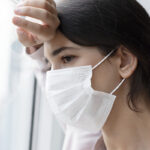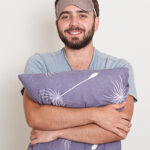Does Covid Cause Insomnia?
The Covid-19 pandemic changed the way the world did just about everything from running businesses to educating children to approach healthcare. With well over 600 million confirmed cases of Covid around the globe since 2020, people are still feeling the short- and long-term effects of this serious and potentially deadly disease.
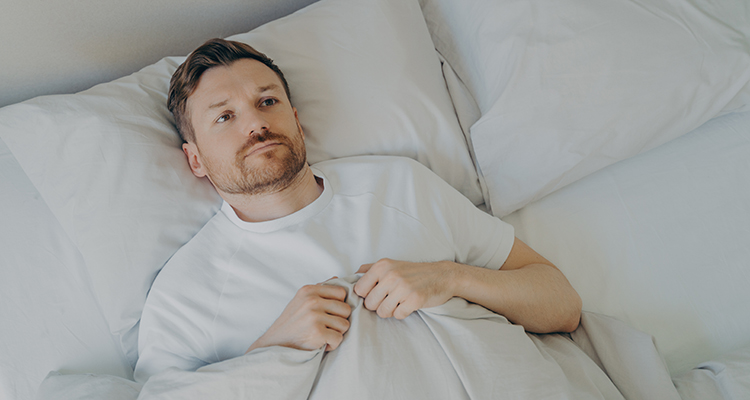
Many people with Covid report having multiorgan complications including heart, lung, brain, kidney, skin, and brain impairments. But does Covid cause insomnia or create other sleep troubles? In this article, we’ll explore how Covid affects sleep when the virus is active in our body and if there are any lingering side effects.
Content
How Does Covid-19 Affect the Human Body?
Covid-19 produces symptoms similar to a common cold but more severe. The seriousness and severity of the virus vary significantly from one patient to the next. Age and underlying health issues play a big part in how seriously the virus impacts a person’s life and health.

Common symptoms include:
- Cough
- Difficulty breathing
- Fatigue
- Fever
- Muscle aches
- Loss of taste and smell
- Headache
- Sore throat
Some people also experience gastrointestinal issues ranging from nausea and vomiting to diarrhea. Because Covid-19 affects everyone differently, some people report trouble sleeping while others feel overwhelmingly tired most of the time.
It’s also important to note that not all Covid-19 side effects and symptoms are physical or are even caused by contracting the actual virus. Millions of people have suffered from mental health disorders including depression and anxiety both during and since the pandemic.
The Connection Between Covid and Sleep
There’s growing evidence that Covid-19 can cause both short- and long-term sleep problems, with as many as 40% of patients reporting trouble sleeping during the pandemic and another 36% exhibiting insomnia symptoms. As much as 31% of people also claim that their sleep troubles and disrupted sleep have continued even after recovering from the virus. Many of these sleep disturbances are linked to both physical and mental health complications.

Over 50% of people reported trouble sleeping when struggling with the illness, mainly due to the above-mentioned symptoms and ailments. For example, coughing or struggling to breathe can make it difficult to fall asleep and cause you to wake frequently.
The connection between sleep and Covid is also bilateral, meaning that as much as the virus may disturb your sleep patterns, lack of sleep could put you at a greater risk of contracting the illness and experiencing more severe symptoms. Quality sleep is fundamental for our overall health and a strong immune system which may protect against Covid-19 or mitigate some of the more serious side effects. Lack of sleep could also affect how quickly a person recovers following a Covid-19 diagnosis.
What is Coronasomnia?
You may have heard the phrase “coronasomnia” floating around but aren’t sure exactly what it is or what it means. Coronasomnia is a play on words and combines the words “coronavirus” and ”insomnia”. The term (although not an official medical term) is used to describe a wide range of sleep problems and disturbances attributed to the pandemic. This includes any reason that stems from the onset of the pandemic, including stress or mental health issues, and not just the SARS-CoV-2 coronavirus itself.
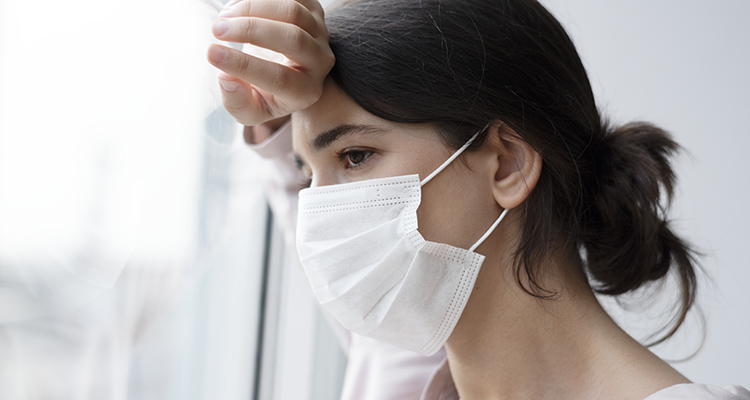
Some of the most commonly reported issues associated with coronasomnia include:
- Reduced or poor sleep quality
- Trouble falling asleep
- Altered bedtimes
- Disrupted sleep schedules and patterns
All of these sleep disturbances can lead to increased fatigue, mental fogginess, and daytime drowsiness. Left untreated, chronic sleep deprivation can result in more serious health complications and cognitive decline.
For many people, coronasomnia symptoms overlap, creating a multitude of different sleep issues that each present themselves differently. Here are some of the biggest areas of life impacted by coronasomnia.
Disrupted Sleep Routines
Worldwide lockdowns and restrictions on a variety of activities outside the house caused many people to adjust their sleep routines. Increased napping during the day, less physical activity and a new work-from-home schedule can all cause disruptions in healthy sleep patterns and routines. These changes in both sleep schedules and traditional daily routines can all impact your body’s natural circadian rhythm and create a higher risk of developing certain sleep disorders and experiencing frequent sleep disruptions.
Increased Isolation
Another common side effect of lockdowns and both school and business closures were increased isolation with a risk of depression. Social isolation was made even more prevalent due to the lack of interaction and social gatherings. The inability to see friends and family, gather in large groups or get physically close to one another all impacted people’s moods, social skills, and happiness. All of these factors are directly related to sleep, which is why social isolation associated with Covid triggered sleep troubles in millions of people.
Stress and Anxiety
Most people were plagued by countless worries during the pandemic and beyond including concerns over finances, work, personal health, and loved ones. Constant worry and uncertainty can cause increased stress levels, which negatively impact sleep. For many, these stress symptoms carried on long after the worst of the pandemic ended. Anxious and racing thoughts worry over getting sick, job loss, and financial troubles can make it increasingly difficult to get sufficient sleep at night. Studies show that individuals with higher stress levels more frequently report chronic sleep issues.
Pandemic Fatigue
Pandemic fatigue is another word created to describe the emotional and physical aftermath of long-lasting infections, like the Coronavirus. Pandemic fatigue is described as the body’s response to prolonged stress that places high demands on our cognitive, physical, emotional, and spiritual energy. As a result, many people find it increasingly difficult to achieve quality sleep. Prolonged exposure to the news and other resources can only add to this fatigue, causing additional stress and mental anguish.
Altered Dreams
One study reported that many people showed an increase in dreams and nightmares during the pandemic. These dreams increased in both frequency and clarity. Nightmares were especially common, causing frequent sleep disturbances and negatively impacting sleep quality.
New Caregiving Roles
Both jobs and learning switched from in-person to virtual during the pandemic, changing the family dynamic. Parents that used to work in the office were now forced to juggle work and home life in the same environment. Kids were forced to attend school virtually, with some being home-schooled. These major life changes affected many people’s energy levels, mental health, and sleep patterns.
Mental Health Issues
Speaking of mental health, millions of people reported a spike in anxiety and depression during the pandemic, which also carried over into post-pandemic life. According to one study, 75% of people with depression also suffer from insomnia. These results were prevalent in the United States, China, and other countries impacted by Covid-19.
Compromised Medical Care
Seeking medical care for non-urgent issues saw a significant decrease during the pandemic. People were hesitant to visit hospitals, doctor’s offices, and other healthcare facilities out of fear of exposure. This meant some serious health issues were left untreated, creating more serious, long-term issues. Many of these ailments included pain, heart issues, and depression – all of which can negatively impact sleep.
Undiagnosed Sleep Disorders
Many healthcare facilities closed down during the pandemic, with some never recovering, including sleep centers and labs. These facilities are crucial in diagnosing and treating sleep disorders including insomnia and obstructive sleep apnea (OSA). Without a proper diagnosis, people with OSA can’t gain access to important resources like a CPAP (continuous-positive airway pressure).
Who’s At Risk of Coronoasomnia?
Similar to the Coronavirus itself, some people are more susceptible to developing Covid-related sleep issues. Here are a few of the groups that are at the greatest risk.

Children
Children thrive on routine. School schedules, after-school activities, and bedtimes all work together to help create structure and consistency. Unfortunately, lockdowns and school closures due to the pandemic caused nearly 50% of children to experience sleep difficulties. Lack of social interaction and an increase in screen time use were also factors in these sleep disturbances.
Healthcare Workers
There’s no denying that healthcare workers felt some of the biggest effects of the pandemic. Extended hours with minimal breaks drastically impacted the health, well-being, and sleep of countless nurses, doctors, and other medical professionals. One study reported that 70% of workers suffered from significant sleep impairments.
People with Covid-19
People diagnosed with Covid-19 often experience sleep disturbances due to the symptoms and side effects of the virus including cough, difficulty breathing, body aches, and fever.
The Connection Between Coronavirus and Melatonin
Melatonin is a sleep hormone that your body produces at night to help induce sleep. There have been countless studies on the connection between melatonin production and Covid-19, although the exact correlation is still unclear. Melatonin production is regulated by your body’s sleep-wake cycle. People suffering from coronasomnia and a disrupted sleep schedule may also notice a dip in melatonin levels.
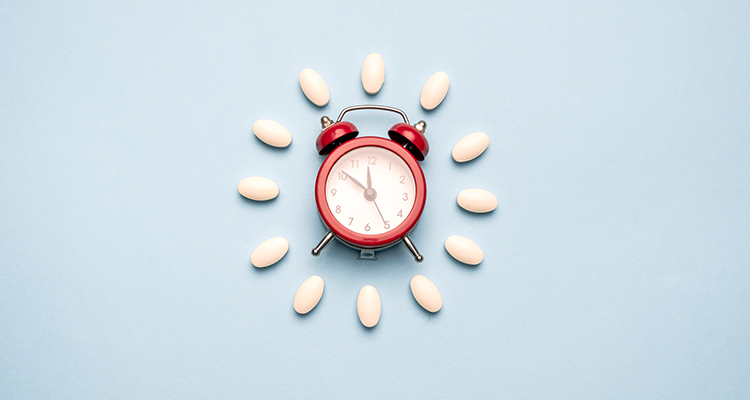
Studies show that melatonin also plays a role in regulating your body’s inflammatory response and strengthening your immune system. Some scientists go as far as to claim that melatonin may eventually be used as a viable treatment for easing symptoms of Covid-19. Early-stage research shows that giving melatonin supplements to patients hospitalized with Covid-19 may improve sleep quality while also reducing the severity of Covid symptoms.
As of this writing, research on melatonin and its effects on coronasomnia and Covid-19 is still limited and ongoing. Speak with a medical professional before taking a melatonin supplement for sleep or to treat sleep disturbances caused by Covid-19.
Does Covid-19 Affect Sleep Long-Term?
Some people only experience coronasomnia for a short period of time. If the physical symptoms of the virus are what’s keeping you up at night (coughing, congestion, etc.), when these subside, you may find yourself sleeping more soundly. The same can be said for the stress and anxiety caused by the pandemic. Whether it’s stress over contracting the virus or anxiety over money, once these situations rectify themselves, you may find you have less trouble sleeping.
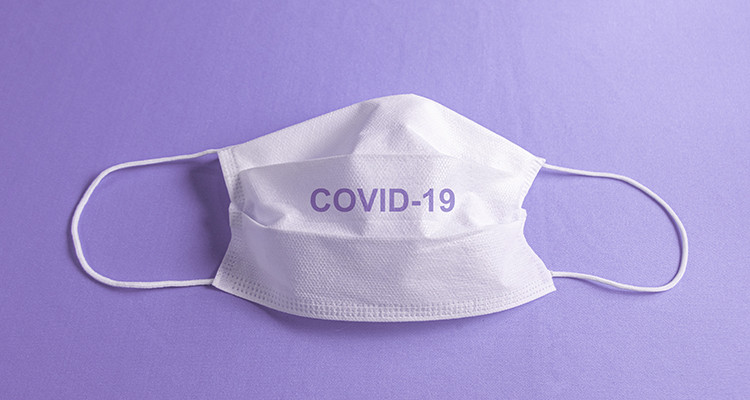
Unfortunately, this isn’t the case for everyone. Some people experience the long-term effects of the virus and the stress it causes. One study showed that 31% of people experience sleep problems as a result of “long Covid”, which is the term used to describe symptoms that persist for more than 30 to 90 days. Research shows that the more severe the initial case of Covid is, the higher the risk of experiencing long-lasting symptoms, although even individuals with mild cases of Covid have reported long-lasting sleep issues. Other long-term side effects include difficulty concentrating, breathing issues, and cognitive impairments.
Here are just a few ways that Covid-19 may negatively impact sleep, in the long term.
- Chronic insomnia
- Mental health problems including depression, anxiety, and other mood disorders
- Changes in sleep architecture (spending less time in a deep sleep)
- Disruption in your circadian rhythm
- Long-term pain and shortness of breath
As doctors and scientists learn more about Covid-19 and its many side effects, they begin to uncover more long-term effects, causes, and treatment options.
Tips for Achieving Sleep After Covid
If you’re currently suffering from coronasomnia or struggling to regain a healthy sleep schedule following the pandemic, these tips may help, most of which are lifestyle changes.
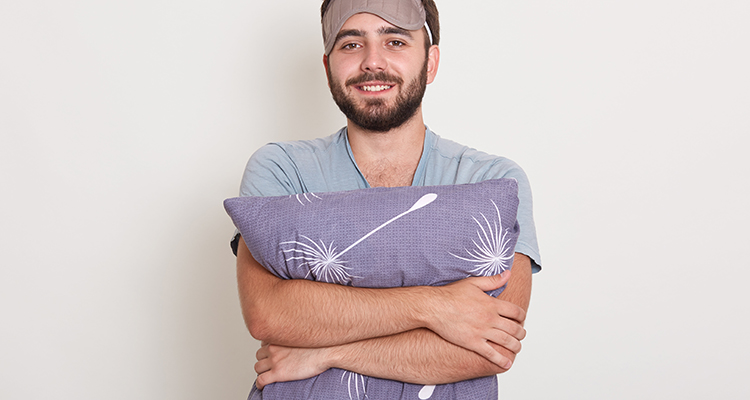
Keep a Journal
Documenting your sleep struggles and triumphs is some of the best ways to identify poor sleep habits and unhealthy patterns of behavior. By identifying them, you can take the next steps to correct them. Track your sleep duration, quality of sleep, and any factors that contributed to it. For example, if you had a particularly stressful day at work, worked an overtime shift, or drank too much coffee before bed, all of these factors could impact your ability to fall and stay asleep. Refer back to your sleep journal to see which behaviors supported good sleep habits and which ones sabotaged your efforts.
Establish Routines
One of the first things to go when the pandemic hit was people’s everyday routines. From work and school to socializing with friends, your life was probably turned upside down, even if it was just for a short time. One of the best ways to establish healthy sleep patterns is to reestablish your daily and nightly routines. Try waking up and going to bed at the same time every night. This helps realign your circadian rhythm.
Follow a consistent schedule during the day whenever possible. Create a nighttime wind-down routine that you perform every night at the same time and in the same order. For example, turning off your phone at 7:00 p.m. before taking a soothing bath, writing in your sleep journal, and meditating. Before long, your body will recognize these behaviors as sleep cues and subconsciously prepare for sleep.
Create a Welcoming Sleep Environment
Your bedroom atmosphere plays an important role in how well you sleep at night. A loud, bright, and disorganized space makes it increasingly difficult to fall asleep. Block out unwanted light and noise using a sound machine, sleep mask, or room darkening shades. Invest in quality bedding that’s soft, breathable, and comfortable. Find a mattress and pillow that offers adequate support for your neck and back. Believe it or not, cleaning up clutter in your bedroom can also help your mind relax at night.
The temperature of your bedroom is also key. A room that’s too hot will result in night sweats and frequent awakenings as you toss off the covers or shed layers of clothing. A room that’s too cold isn’t good either, since you may wake up shivering and looking for more blankets. The ideal temperature for sleep is between 60 and 67 degrees Fahrenheit. Your body’s core temperature naturally drops before sleep, so by lowering the temperature in your bedroom beforehand, you’re helping your body prepare for sleep.
Avoid Stimulants Before Bed
The last thing you need is more adrenaline running through your body at night. If you’re plagued by racing or anxious thoughts, caffeine can heighten your state of arousal, keeping sleep at bay. Avoid drinking caffeinated beverages including coffee, tea, soda, and sports drinks too late in the day. It’s recommended you stop consuming caffeine between noon and 2:00 p.m. depending on your sleep schedule.
Alcohol and nicotine are two more stimulants that may be interrupting your sleep patterns without you realizing it. Although alcohol may relax you at first, once these sedative properties wear off, most people feel agitated, fidgety, and even paranoid. Avoid drinking alcohol in excess if you’re struggling with sleep problems.
Stay Active
Daily exercise is proven to help you sleep better at night. By exercising in the morning, you’ll experience not only an initial energy boost but also increased fatigue as night falls. The more tired you are closer to bedtime, the easier you’ll fall asleep. Exercise is also linked with improved mental health and reduced signs of depression and anxiety. Physical activity triggers the brain to release feel-good endorphins that promote feelings of calm and happiness. If depression or stress from the pandemic is plaguing you and keeping you up at night, exercise might help.
Utilize Daylight
Although it’s recommended you reduce light exposure at night, increased exposure to sunlight during the daytime hours can actually help balance your circadian rhythm, making it easier to fall asleep. Doctors recommend you get at least 30 minutes of daylight exposure or more, ideally in the morning. If this is difficult due to your work schedule or other obligations, you can consider light therapy as an alternative.
Talking to Your Doctor About Coronasomnia
If you’re still struggling with coronasomnia or other residual side effects of the pandemic that are disrupting your sleep, it may be time to speak with a medical professional. Left untreated, insomnia can cause a long list of other health complications, both physically and mentally. If you adopt the above-mentioned lifestyle changes and don’t see an improvement, a sleep specialist may be able to recommend other treatment options or medication.

Other signs it’s time to see a doctor include:
- Persistent physical and mental symptoms of Covid-19
- Ongoing or worsening sleep problems
- Significant daytime sleepiness that is affecting daily function
- Waking up during the night struggling to breathe
- Excessive snoring
- Increased levels of emotional stress, anxiety, depression, or other mood swings
Take Back Your Life Post-Covid
The entire world was impacted by Covid-19 in varying degrees. Whether you had the virus or lost a loved one to it, lost your job, or were lucky enough to not get it, chances are, you felt the effects one way or another. And some people are still struggling to overcome these effects.
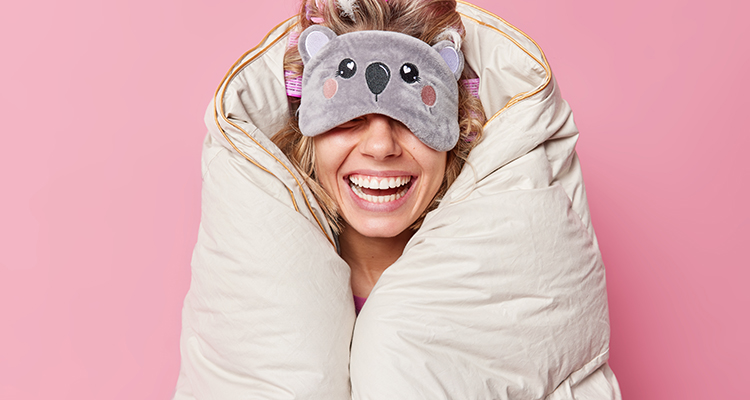
If you’ve experienced sleep troubles due to the pandemic and are still working to improve your sleep quality and habits, the experts at Somnus Therapy can help. Our online therapy treatment program is designed to help you identify and understand the root cause of your sleep disturbances and offer various treatment options.
Click here to get started on the path to a blissful night’s sleep and an improved quality of life.



